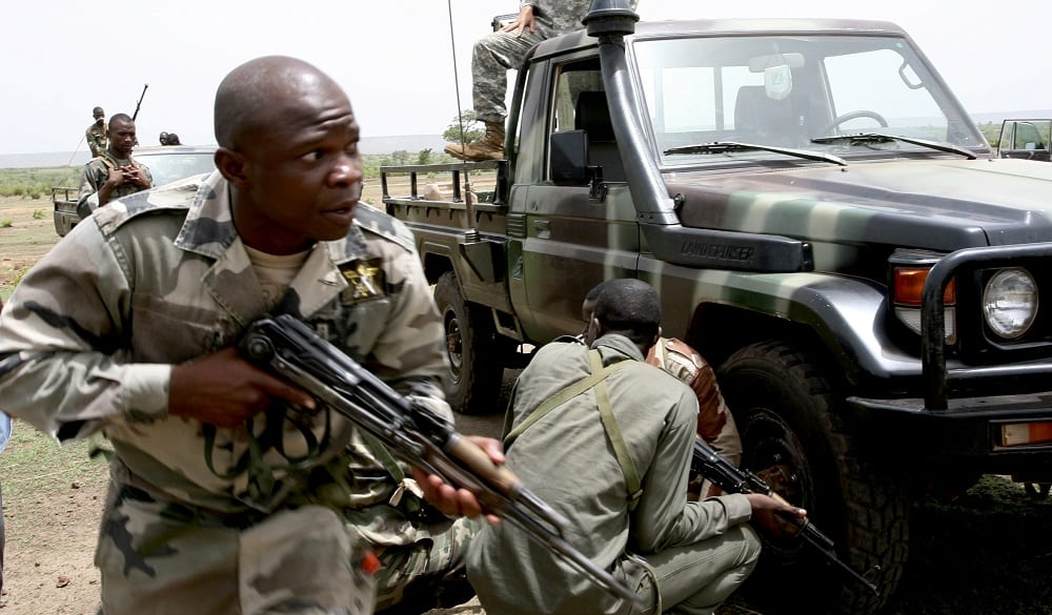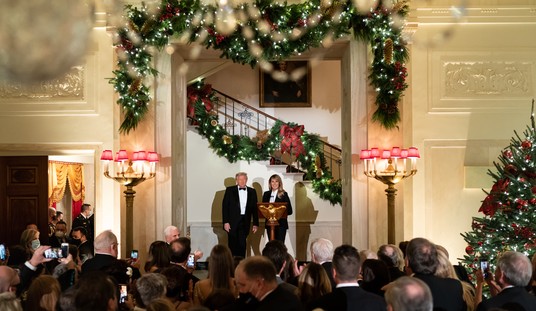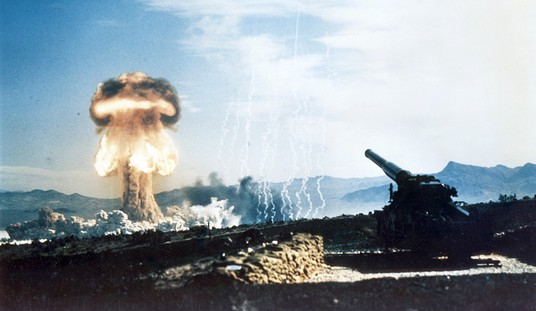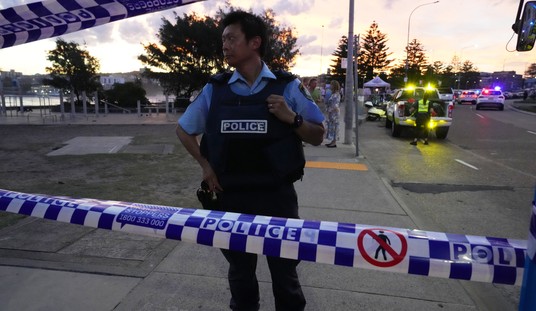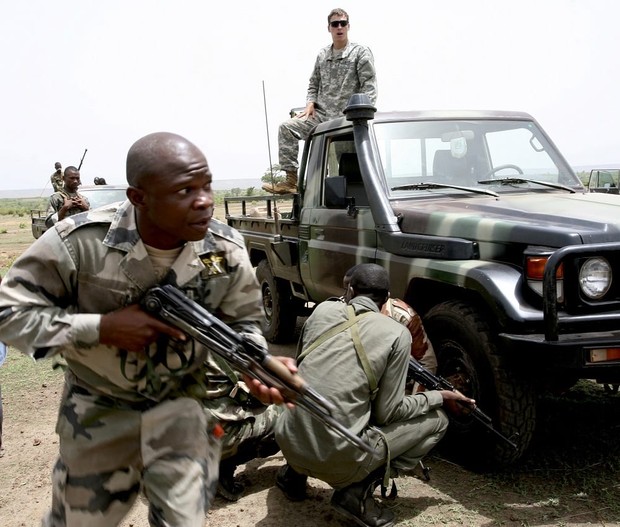
FILE – In this Monday, May 10, 2010 file photo, Malian special forces drill to face off an ambush as an unidentified U.S. Special Forces soldier gives instructions from a Malian truck in Kita, Mali, during a joint training exercise. A new Tuareg rebel group, whose members include former pro-Gadhafi fighters, say Wednesday, Jan. 18, 2012, that they have launched a second day of attacks in northern Mali towns. Col. Idrissa Traore, spokesman for Mali’s Armed Forces, confirmed fighting in the two northern towns, but did not provide details. (AP Photo/Alfred de Montesquiou, File)
The New York Times has published an interesting article about U.S. military efforts in Africa and the Trump Administration’s desire to drastically reduce, if not outright eliminate the U.S. troop presence on the African continent. From the article:
WASHINGTON — Defense Secretary Mark T. Esper is weighing proposals for a major reduction — or even a complete pullout — of American forces from West Africa as the first phase of reviewing global deployments that could reshuffle thousands of troops around the world, according to officials familiar with internal deliberations.
Read: Pentagon Eyes Africa Drawdown as First Step in Global Troop Shift
Further in:
The deliberations stem from a push to reduce post-9/11 missions battling terrorist groups, and instead to refocus Pentagon priorities on confronting so-called Great Powers like Russia and China.
This is the first real look at this theater of operations since four U.S. special Operations soldiers were killed in an ambush two years ago while on a joint patrol with Niger‘s forces chasing Boko Haram. I find it interesting that today, the Times’ position on U.S. Troops in Africa is very supportive, now that President Trump is considering withdrawing them. Early on in his administration, their attitude appeared quite different.
Check out: New York times reporting on US casualties in Niger – Google Search
The purpose of this article isn’t to focus on the hypocrisy of the New York Times. After all, Red State has a word limit for its articles. However, I would be remiss if I failed to point out that during the Obama administration, there appeared to be very little pushback (except perhaps from Rand Paul) about Congress’s role and authority to authorize foreign military adventures (I’m talking to you, Senator/LtCol, USAFR Graham).
What I’d like to do here, is put our military efforts on the African continent, in their proper context and thereby hopefully put to rest accusations of some nefarious, secretive plot to expand US combat operations worldwide. First of all, let’s begin with United States Army Special Forces, the “Green Berets.” By the way, most of them don’t care for that appellation. “A Beret is a hat, not a Soldier.” US Army Special Forces, SF for short, have 5 primary missions: Foreign Internal Defense (FID), Unconventional Warfare (UW), Direct Action (DA), Counter-Terrorism (CT), and Special Reconnaissance (SR).
The last 3 tend to be what most Americans, through movies, TV and Tom Clancy novels, tend to be familiar with. Special Forces units blowing up the quintessential “critical bridge” (DA); Taking out a known terrorist (CT); or locating hidden SCUD launchers for later destruction by the U.S. Air Force (SR). Due to space considerations, the above is a highly simplified description–I hope my friends in that community will forgive me in that regard.
The real “bread & butter” of Special Forces operations are the FID and UW missions. Foreign Internal Defense or FID (what is now going on in Africa) is our effort to support friendly governments without having to deploy massive amounts of conventional or “heavy” forces–Armor, Motorized Infantry & Artillery. Unconventional Warfare (UW) is the mirror image of FID, where SF elements help the anti-government forces overthrow a government hostile to the US, as we did to the Taliban in Afghanistan.
The basic Special Forces unit, the “A” Detachment, is composed of 2 Officers and 10 Noncommissioned Officers. These highly-skilled, trained, and motivated Soldiers are capable of organizing, equipping, training and advising or directing, indigenous forces up to battalion size. This is what is going on on the African continent and in support of governments friendly to the U.S. Multiple “A-Teams,” with their supporting headquarters, are assisting friendly governments in fighting ISIS, Al Qaida, and other terrorist organizations, but without the involvement (and cost) of major US Combat Forces. That’s the “what.”
Now to the “why.” Why do we have Army Special Forces Soldiers tramping around in Africa? The answer to that comes from the US Military’s Principles of War, themselves derived from those promoted by 19th Century Prussian Strategist, Carl von Clausewitz. One of the most important of these, especially in these days of tight budgets and even tighter political constraints is, Economy of Force.
The US Army Field Manual, FM 3.0 (Operations), defines and describes Economy of Force as:
“Allocate minimum essential combat power to secondary efforts. Economy of force is the reciprocal of mass. It requires accepting prudent risk in selected areas to achieve superiority—overwhelming effects—in the decisive operation. Economy of force involves the discriminating employment and distribution of forces. Commanders never leave any element without a purpose. When the time comes to execute, all elements should have tasks to perform.”
Put another way, we can use small elements to “keep a lid” on terrorist operations in Africa, while our “heavy forces” are either engaged in Southwest Asia, performing deterrence missions in South Korea, or refitting, re-equipping, and training back in the United States, for whatever other contingency that may pop up. Using these small elements of Special Forces to train, advise and assist forces belonging to U.S. African Allies, we are also able to avoid much of the political, economic, and human costs associated with deploying Division sized conventional forces.
The operational tempo (OPTEMPO) of today’s military has stretched Soldiers, their families, and their equipment to the breaking point. Moreover, it’s generally better for U.S. taxpayers and relatives of Soldiers, to help an ally help himself than to do all the work for him. I thoroughly understand and support President Trump’s desire to focus on the big threats, namely China and a resurgent Russia. The Economy of Force operation throughout the African continent is a good way to deny access to the Chinese and the Russians, without engaging in a major, costly and dangerous fight.
Now comes the tough part–What is Congress’s role in all of this? That, my friends, is the subject of another article.
Mike Ford, a retired Infantry Officer, writes on Military, Foreign Affairs and occasionally dabbles in Political and Economic matters.
Sign up for Red State VIP! Promo Code: FORD
Follow him on Twitter: @MikeFor10394583
You can find his other Red State work here.

